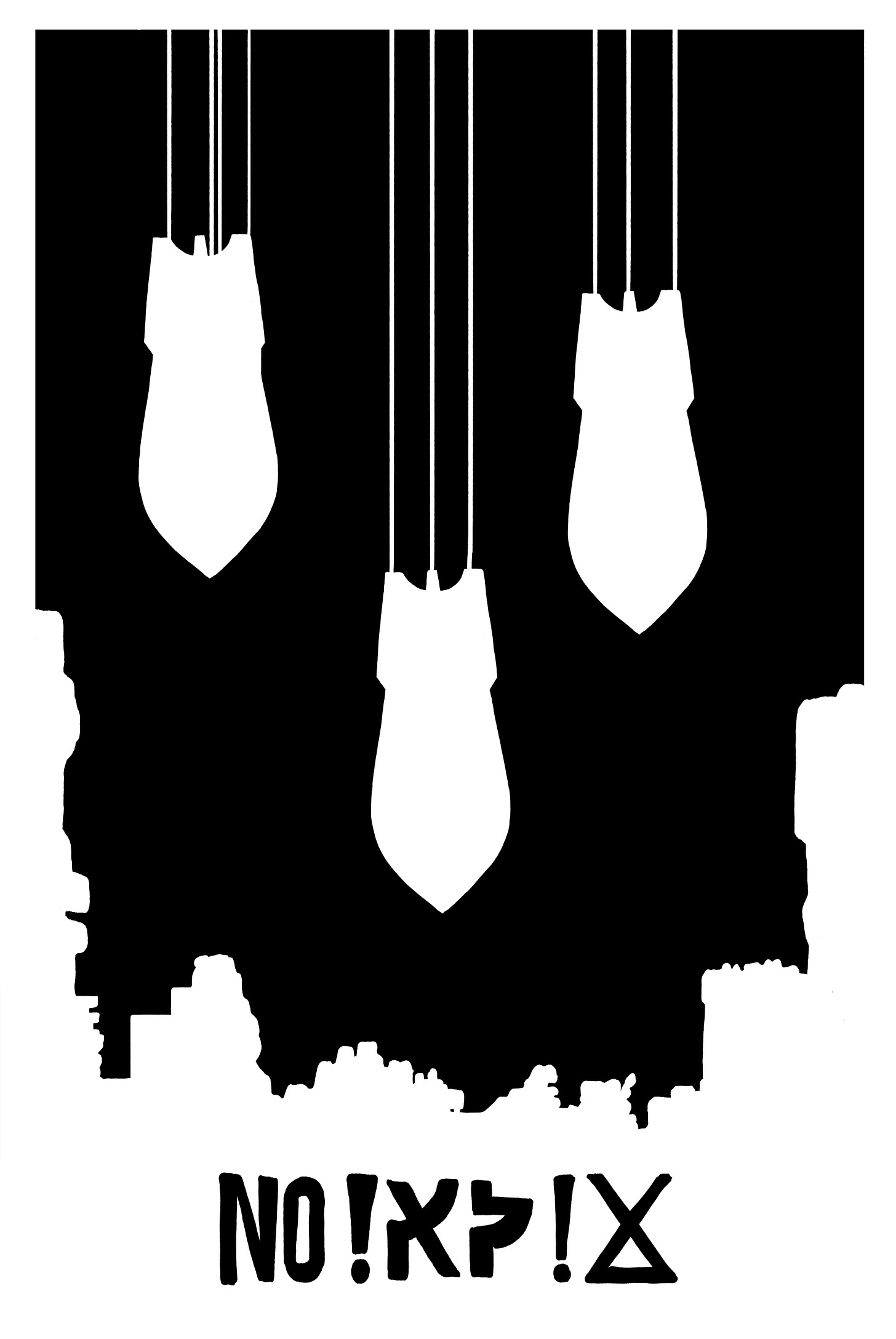“Give a person a fish and they will eat for a day. Teach a person to fish and you feed them for a lifetime.”
— Proverb
Art in Times of Conflict
Times of Conflict is pretty much all the time. Our awareness of the existence of conflict or not has to do with how well our antanea is attuned to that sort of thing, and I'm not sure how well any human is equipped at being attuned to all conflict everywhere all the time. Because with conflict comes human suffering, and taking on all human suffering all the time is an unreasonable load for any one person to bear. But conflict does exist all the time and sometimes we are made aware of it. And sometimes that conflict is so terribly bad that it is impossible to ignore even if you try. Anyone who tells you some version of the world being better now than it was however many decades ago, or some version of how the world is much safer thanks to America (likely in reference to American military "intervention"), then that person clearly has an Ameri-Euro centric view of the world which by definition is imperialist and wholly limited, and thus inaccurate.
Okay, so a major conflict arises to which we are not only made aware of, but we also feel a burning urge to address. And the best way we can address it is through the language we know best, the language we've spent the better part of our lives honing: our art (and by art, that can be any which artform in existence; writing, drawing, singing, etc.). How does one go about utilizing their artform to address said conflict?
Fill the vacuum.
What I mean by that is you examine what is being said, what is already out there, and you attempt to pinpoint the thing that needs saying but no one has managed to say just yet (this, by the way, is what I subscribe to when it comes to all forms of art-making in general, conflict-related or not). From the things already being said, some things will be said louder than others. Those are the things you probably want to avoid, because anything you do would at best be a mere echo of the loud things that everyone is already hearing. The results are likely to be rather pointless.
When it comes to conflict, there are two main sources through which loud voices can best be heard. Let's call them the two P's:
a) Press
b) Protests
When it comes to Press, many people would like to think of it as a source for truth—something many an outlet attempted to stress in their promotional material following the popularization of the term "fake news"—but the reality is fake news has always existed, continues to exist today, and will certainly carry on existing in the future. It should be expected that the bigger the news outlet, the higher the likelihood that the material it produces is designed to pander to major political and economic interests. If however that is not the case, then the material produced will at best only serve as a partial truth. In order to obtain the complete truth, one must immerse themself in as many a diverse news source as possible, without ever believing that any single one of them is capable of constituting the entire truth. And even then, after such diversified immersion, one must acknowledge that despite acquiring a great deal of knowledge they probably still don't know the entire truth. But in any case, looking at what the Press has to say is in most cases going to give you an idea of what not to say. If for no other reason than it probably doesn't really need to be parroted by you or your art. It is already amplified without you, unless we're talking about the quieter stories that tend to get buried under the heaps of loudness.
Protests, the other source of loud voices, I divide into two: Pro-Protests and Anti-Protests. The Pro being mobilizations that take place to voice the same notion voiced by major press outlets, which by definition isn't a very protesty thing to do. Those, you can ignore. You probably get the gist of what they're about through the press anyway. The Anti-Protests on the other hand; well, those can give you a good picture of something contrary to what major press has been feeding you. An opinion of your own starts to take form. It isn't fully formed yet, because you still don't know all the things, but it is certainly far more formed than when you first became aware of the conflict. At this point, your opinion may still mirror that of major press, or it may mirror that of the anti-crowd, or it may be something else entirely, a thing that isn't being said that exists somewhere between the two core really loud things being said. If one of the first two scenarios is true, and you effectively agree with whatever is being said, there's still the possibility that maybe you're not entirely sure about the effectiveness of how it is being said. Either way, at this point an idea will likely begin to form in your mind. It may not be the best idea in the world, but it'll be a good one. I'll get to how one might arrive at the best idea in the world in just a second. For now, let us discuss the good enough idea you've arrived at.
If your artform is visual, what you'll want to do is reduce your idea to two or three elements or “icons” if you will. A few examples from my own work might be:
1) Tank vs. Bread-biker
Egypt 2011, when military generals assumed the role of "transitioning the country from dictatorship to democracy" (which clearly worked out swimmingly), it seemed like a good idea at the time to point out that the military's interests—represented by the tank—were at odds with the interests of the general public—represented by the bread-biker, a sight seen every morning in the streets of Cairo as freshly-baked bread is whizzed from bakeries to eateries (the panda was later added by another street-artist who went by the moniker Sad Panda).
2) The Truth is Concrete
Frankfurt 2012, the banking capital of Europe, where it felt apt to highlight the EU's financial interests in the wars that break out in Africa where child soldiers are often recruited and affected.
3) No Bombs
Two things needed to be expressed:
(a) Bombing cities causes death.
(b) It needs to stop.
By combining the bombs and cityscape in a way to resemble a skull, the notion of death is communicated. Incorporating a simple “No!” in multiple languages clearly expresses objection.
You get the idea. I imagine there's a way to apply the same theories of reduction and simplification to other artforms, but I'm not well-versed enough in other artforms to pontificate on how that might work. Happy to hear thoughts.
Now, for the method by which one might arrive at the greatest idea in the world (cue drumrolls): Research.
A lot of it. Books, seminars, and even more books. Caveat though: The great paradox of obtaining knowledge is that the more you know, the more you come to know that there is even more out there that needs knowing, which means you know that you still don’t know much. And so the noble quest of arriving at the greatest idea in the world can sometimes backfire and lead only to paralysis. That being said, I do believe that the pursuit of knowledge is a far more worthy enterprise than the churning out of half-baked ideas.
Now one might ask: Why should an artist have to be concerned with world conflicts at all?
They shouldn't. The only obligation they have is to be concerned with whatever it is they deeply care about. But here's the thing—artist or not—what does it say about a person who doesn’t much care about the suffering of other human beings?
Link Station
The Palestinian Problem | Ganzeer.Today
Bassem Youssef Destroys Pierce Morgan And All Mainstream Western Media, Really | Youtube
Free Downloadable Hi-Res Resistance Poster Pack | Ganzeer’s Drive
Mail
Toni wrote:
Don’t quite understand how (given your politics/perspectives) you’re promoting anything russian given the circumstances. Especially regarding a movie about/in space, which is, like, extremely thinly veiled propaganda from a fascist, imperialist state that’s actively doing a genocide right now.
+ + +
Dear Toni,
Having been born, raised and lived for a good chunk of my life in an autocratic dictatorship—and worked as an artist there no less—I’ve learned to generally separate the artistic output of a people from the politics of the state within which they reside. This feeling has even been compounded upon my relocation to the United States, a country with a great many shortcomings in its policies, be they domestic or international, both historically and today. It is also a country that produces a great deal of artistic output infused with abhorrent propaganda I do not at all agree with (pick literally any cop drama, any war movie, or any lone gunman revenge flick). Despite my reservations in regard to what a work may be propagating, I’ll still readily immerse myself in the stuff for two reasons: (a) The craft and potential artistic merit, and (b) To see the things that are being propagated and examine how they are being propagated so I know how best to combat them in my own work if it’s something I’d like to take on.
However surprising this may be to you; I assure you it’s actually very normal. After all, you can bet there are plenty of people inside the White House right now examining all kinds of Russian propaganda for reasons that are not entirely dissimilar.
In any case, the most important thing really is not to support Russia’s criminal regime financially, so you won’t see me attempting to purchase THE CHALLENGE anytime soon. However, finding a way to watch the film without giving Russia my money, I think will do me a service more than it would do them. It’s the only fictional film ever shot in space for cryin’ out loud! That, dear Toni, is one hell of an impressive feat, and as such is a landmark of artistic output for all humanity at large, forget about nation states. Granted, I haven’t seen the film, and acknowledge that it still may suck for all I know. But forget about the entire film, Toni. All I did was share a trailer. A trailer, Toni, a trailer. There really is no need to be so terribly fearful of what insidious influence watching a mere trailer might have on your mind. Relax.
Ganzeer
Houston, TX





